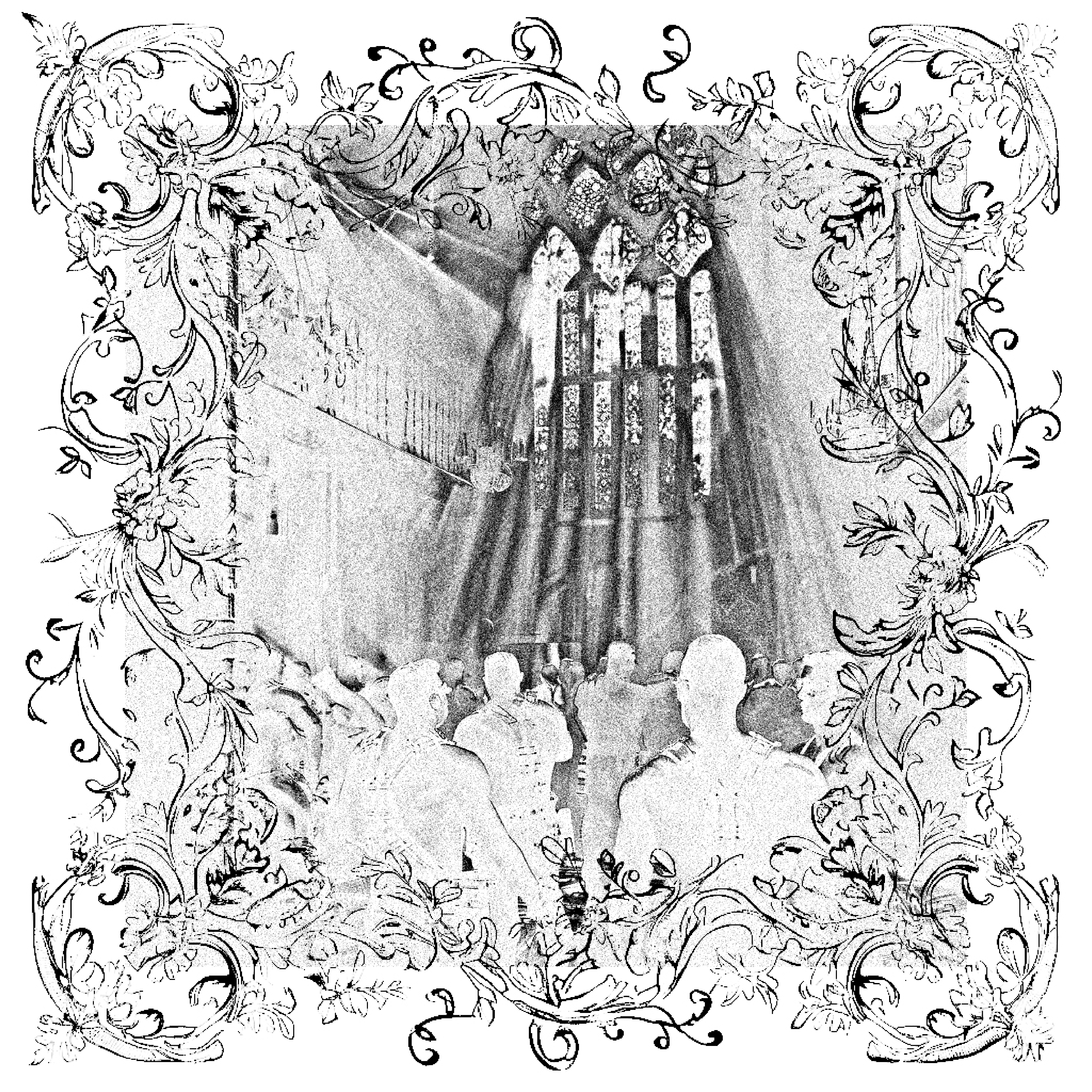Published on 14.06.2024
Carlo Canún is a Mexican graphic designer. In 2023, he graduated from the Estonian Academy of Arts with an MA in Graphic Design. The same year, his thesis Glory Holes and his project “Infected lexicon of language” earned him EKA’s Young Designer Award. He is interested in forms of language such as gossip, myths, lies and confabulations as tools for challenging sources of information and their bias structures. His work questions knowledge production methods and explores queer histories and identities through alternative forms of narrative, communication and documentation.
I’ve been preoccupied with the idea of knowing everything about my ex’s new boyfriend: How does he talk? How does he fuck? How big is it? Does he like to read? What does he read? Is he smarter than me?
“Burroughs defines paranoia as ‘having all the facts’.”1 Humanity has been obsessed with the idea of absolute knowledge, of a place – which like Borges’ Library of Babel – contains everything that there is to know. Trying to be in control of every situation, and like the way we read, we are always looking for shortcuts that will give us find the answers to our questions: “100 books you should read before you die,” “Dua Lipa’s Monthly read,” “10 books you have to read if you are a power bottom2”…
“When I published three years ago an article in the New York Times magazine about the current state of gay fiction, I received dozens of letters from teachers asking me for a reading list […]. Some people seemed uncertain about which lesbian and gay books should be considered classics. […] I myself am in favour of desacralizing literature, of dismantling the idea of a few essential books, of retiring the whole concept of a canon. A canon is for people who don’t like to read […]. Any real reader seeks the names of more and more books, not fewer and fewer.”3

He later suggests that we should be concerned with how to read, instead of what to read. Our queer nature demands that we reinvent the “conventional”. Reinvent love, relationships, language, the way we fuck. “Convention does not govern us; we create new conventions for ourselves.”4
I know I’ve always been gay. I can remember desiring men at a young age. The likelihood of me getting a gay porn magazine was almost zero, but I was clever. There was this TV actress that was on the cover of a porn magazine at the time, the ads were on every newsstand. I knew she was a friend of my father’s so I pretended to have a crush on her. I guess this made my father very happy after all the doll play. I didn’t only get the magazine, but a signed copy. At home I cut out all the pictures of men and pasted them on a notebook. I created my own porn magazine.
The way we read, create, and publish queer history, also asks for reinvention in order to preserve the past and create a future.
“[…] another joy of being gay is the philosophic turn of mind you are forced to develop. Whereas heterosexuals can, conceivably grow up without questioning their goals, their motivations, every homosexual must think everything out from the bottom up.”5
The last two books I have been obsessed with have come to me because of being gay: Castle Faggot by Derek McCormack (2020) and The Burning Library. Writings on Art, Politics and Sexuality 1969–1993 by Edmund White (1994). Not casually, I received both publications as gifts from people dear to me. Castle Faggot’s dedication includes a description of myself: “[…] a cute freak with a nasty sense of humor.” The Burning Library’s dedication includes a moment in time: “Carlo, happy graduation.” These two books have become essential in my physical library, as well as in the library of my mind.
The library of the mind is composed of the connections, relations, and events that affect and inform our readings. The library of the mind is one that loses its rigour and can transform and transcend the indelibleness of the physical library in any way. It expands into storing that which is impossible for any physical library: gossip, feeling and experience. It has to do with identity. The library of my mind is the one that remembers reading that John Cage was a closeted gay. A piece of information that changed my understanding of his obsession with silence.

I recently became obsessed with a guy. He wasn’t into reading, nor into guys. It was the impossibility of being with him which made him so desirable. I feel similarly about the copy of Faggy Gestures by Henrik Olesen that I don’t have. The fact that it’s now $339.16 USD at its cheapest makes my memory of it more precious. I keep going back to the pictures I have on my phone from the copy belonging to the EKA GD MA Library.
There is a certain allure to the things we yearn for but do not have. This phenomenon extends to our hunger for knowledge. Gossip, for instance, holds a powerful appeal simply because it reveals what we don’t yet know. In drawing parallels between someone we can’t have and the gaps in queer history, we realise that both rely on imagination and reinterpretation. Just as we fantasise in order to possess someone unattainable, we use our emotions, feelings and dreams to claim the missing pieces of queer history as our own.
I became obsessed with being obsessed. Even my algorithm knew. I still receive self-help Tik Toks on the topic: “Obsession is only able to happen when someone is unavailable to us. Because if someone is truly with you – physically, emotionally and intellectually, then there is no room for the obsession to come in. So if you’re obsessed with someone, you’re probably obsessed with that space in between.”6

In between learning more about obsessive behaviours and looking for material to complete my fantasy, this crash7 became the main topic for everything I consumed: I read The Sluts by Dennis Cooper, Lolita a second time.
“[…] Gregg Bordowitz has promoted “promiscuous” reading in which you impulsively allow an “imposter” book to overrule any reading trajectory you might have set for yourself, simply because, for instance, a friend tells you in conversation that he is reading it and is excited by it. This evokes for me the most potent kind of reading–reading as flirtation with or eavesdropping on someone you love or desire, someone who figures in your fantasy life.”8
All my reading became promiscuous, but differently to Moyra’s observation, it was prompted by myself. Like Malraux’s Musée imaginaire, I was creating a library that only worked in the library of my fantasy. I even made-up some book titles such as Crashing Overload: I created an imaginary library. The joy of the imaginary library, just like that of fantasy, relies on its ability to create everything anew. It has sufficient space to be filled with what we long for. Its infrastructure is shaped by our dreams.

“I can be your baby in real life, sugar
I can live in your dreams
I can be what you need me to be, baby
Will you be my fantasy, little baby?
You’re just what I need
Can you be my fantasy, little baby?
You’re just what I need
I can be what you need, little baby
Just tell me what you need”9
“Kerosene!” became the soundtrack of that era. As Yves Tumor sings, we hold the ability to transform ourselves into who we aspire to be, driven by our desires. Similarly, the act of reading holds transformative power. My horoscope from 25 March 2024 read: “You get to inhabit the worlds of your favourite books whenever life gets too overwhelming.” Just as narratives can interfere with our reality, the meaning of a text can shift depending on its context. Reading is always intertwined with other activities; it cannot exist in isolation.
I was on a date with a guy I wasn’t into: he was overly-optimistic and smiling too much. My interest was diminishing until he mentioned that Giovannis Room by James Baldwin was one of his favourite books. I tell him I love the ending. This leads to us fucking. We both come on my abdomen. While I’m loading,10 he goes to grab his copy of Giovannis Room and reads:
“The morning weighs on my shoulders with the dreadful weight of hope and I take the blue envelope which Jacques has sent me and tear it slowly into many pieces, watching them dance in the wind, watching the wind carry them away. Yet as I turn and begin walking toward the waiting people, the wind blows some of them back on me. THE END”11
It felt like something he has rehearsed before. I could feel my belly tensing as the cum started to dry. I cringe.

Spontaneous readings have become my favourite kind. “[...] knowledge lies not in the accumulation of texts or information, nor in the book itself, but in the experience rescued from the page and transformed once again into experience […].”12 It doesn’t become only about the text, but everything that revolves around it, even the whims of chance.

A friend and I are at a gay club for my birthday. We feel overdressed for the occasion. Overdressed as in too many clothes. We decide to take a break from dancing and find the only window around. By the way the light is coming through the stained glass, I can guess it’s already midday. Discussing the current state of my love relationship at the moment, my friend remembers a part of an interview between an artist and an art historian in On Display and Questioned worth bringing to the table. She starts reading from her phone:
“The interviewer says:
“The same illustrates your theory that gay men in relationships tend to become the same or become one. This is expressed in a faux-algebraic symbol: 2 fused with 1.”
The artist responds:
“At a more extreme level, men become sardined: available in packs that can be ordered and opened at pleasure. Or like Spam, because it exits the can or sits in the can as a single entity and can be cut up for smaller usage, which is in turn diluting these ‘individuals’. There are no longer contours to the body but rather it is just a slab, a homogenised slab.””13
The reading starts to be illustrated by barely noticeable background techno music and half-dressed clubbers decorated in harnesses, jockstraps and lingerie. I can’t avoid thinking of Castle Faggot: “A faggot hangs himself-he's décor; a faggot slits his wrists-he’s décor; a faggot shoots himself in the head-he's décor. What do you call a faggot hanging from a chandelier? Crystal.”14

As the reading continues, I feel I am floating. My friend thinks I want the reading to stop, but I am unable to respond. The whole moment starts to feel like an illusion. For a second I wonder if my friend and I are just at home watching porn, but the Sun coming through the window starts to burn my skin.

“The interviewer asks:
“What are some of the signs you are becoming your boyfriend?”
The artist responds:
“As one becomes more involved, becomes less themselves, each starts to usurp each other’s identities or personalities. It comes to a point where the dynamic is a recycle logo, and each become each other in a muddy, confusing pit. The things you hate about yourself become the traits of the other person, who is in turn you and vice versa; so it is preferable to be in single form.””15
Memories start flashing in my mind of all the times I have been told me and my boyfriend look alike. It instantly becomes a scary thought: we are really becoming one. But what could have ruined my day, turns into a new word for my project Infected lexicon of language: “lovevol,” I think.
I come back to reality as my friend says: should we go back to dance?
I decide: if gayness determines my universe it might as well determine my reading too.16
References
- Edmund White, “This is Not a Mammal” in The Burning Library. Writings on Art, Politics and Sexuality 1969–1993 (Picador: London, 1995), p. 111.
- A bottom is a person who is penetrated during gay intercourse. Due to heteronormative views on sex, a bottom is stereotypically thought to be the submissive partner. A power bottom is a dominant receiver.
- White, p. 375.
- White, p. 34.
- White, p. 34.
- @momentary_existentialism, “I think obsession is only able to happen when someone is unavailable to us,” Instagram reel, 2 March 2024, https://www.instagram.com/reel/C4BEEOECG9h/?igsh=dmZ2NHd3a2VjdDln.
- Crash / crashing. v. n. falling for someone who does not fit your own sexual orientation. According to www.infectedlexiconoflanguage.xyz
- Moyra Davey, “Index Cards” in The Problem of Reading (Fitzcarraldo Editions: London, 2020), p. 229.
- Yves Tumor, “Kerosene!,” Track 4 on Heaven to a Tortured Mind. Warp Records, 2020, CD.
- Loading. v. waiting for someone to bring toilet paper while you’re covered in cum. According to www.infectedlexiconoflanguage.xyz
- James Baldwin, Giovanni’s Room (London: Penguin Classics, 2000), p. 163.
- Alberto Manguel, La biblioteca de noche (Madrid: Alianza editorial, 2022), pp. 121–122.
- On Display and Questioned. Two exhibitions by Alex Vivian; two interviews with Alex Vivian (Tallinn, 2023), p. 104.
- Derek McCormack, Castle Faggot (Semiotext(e): South Pasadena, 2020), p. 19.
- On Display and Questioned. Two exhibitions by Alex Vivian; two interviews with Alex Vivian (Tallinn, 2023), p. 104.
- Reinterpreted from the quote “I am talking about Lynne Sharon Schwartz, who, citing ‘the John Cagian principle’ that if randomness determines the universe it might as well determine my reading too,” from “The problem of reading” in Index Cards by Moyra Davey, p. 238.